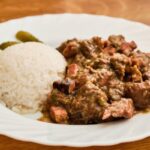Vitamin B12, also known as cobalamin, is an essential nutrient that plays a vital role in various bodily functions. It’s crucial for nerve function, DNA synthesis, and the formation of red blood cells. Unlike some other B vitamins, B12 is not found in many plant-based foods, which can make it challenging for vegetarians and vegans to obtain sufficient amounts through diet alone. This article will explore Which Foods Contain Vitamin B12, recommended daily intakes, and potential consequences of deficiency.
The Importance of Vitamin B12
Vitamin B12 is essential for maintaining overall health. It contributes significantly to:
-
Red Blood Cell Formation: B12 is crucial for the proper development of red blood cells. A deficiency can lead to megaloblastic anemia, characterized by large, abnormal red blood cells.
-
Nerve Function: Vitamin B12 helps maintain the health of nerve cells and the myelin sheath, a protective covering that surrounds nerve fibers. Deficiency can lead to neurological problems.
-
DNA Synthesis: B12 is involved in the synthesis of DNA, the genetic material in all cells.
-
Energy Production: Although B12 does not directly provide energy, it helps the body utilize energy from food effectively.
Which Foods Contain Vitamin B12?
Vitamin B12 is primarily found in animal products. Here’s a detailed look at the best dietary sources:
Animal Products: Excellent Sources of Vitamin B12
-
Meat: Beef, lamb, and pork are excellent sources of vitamin B12. The amount of B12 varies depending on the cut and cooking method.
-
Poultry: Chicken and turkey contain vitamin B12, though generally in lower amounts than red meat.
-
Fish: Many types of fish are rich in vitamin B12.
- Salmon: Known for its omega-3 fatty acids, salmon is also a good source of B12.
- Trout: Another excellent choice, providing a substantial amount of B12 per serving.
- Tuna: Both fresh and canned tuna are good sources.
-
Shellfish: Clams and oysters are particularly high in vitamin B12.
-
Dairy Products:
- Milk: Cow’s milk is a good source of vitamin B12.
- Cheese: Certain cheeses, like Swiss and mozzarella, contain notable amounts of B12.
- Yogurt: Plain yogurt can contribute to your daily B12 intake.
-
Eggs: Eggs, particularly the yolks, contain vitamin B12.
Alt text: A plate featuring two fried eggs alongside a slice of toast, illustrating a common breakfast meal that provides vitamin B12.
Fortified Foods: A Plant-Based Option
Since vitamin B12 is not naturally abundant in plant-based foods, fortified foods are crucial for vegetarians and vegans.
-
Fortified Breakfast Cereals: Many breakfast cereals are fortified with vitamin B12. Check the nutrition label to ensure the product contains B12.
-
Fortified Plant-Based Milks: Almond milk, soy milk, and other plant-based milk alternatives are often fortified with B12.
-
Nutritional Yeast: This deactivated yeast has a cheesy flavor and is often fortified with B12, making it a popular ingredient in vegan cooking.
-
Fortified Tofu and Tempeh: Some tofu and tempeh products are fortified with vitamin B12.
Supplementation: When Diet Isn’t Enough
For individuals who struggle to obtain enough vitamin B12 through diet alone, supplements are an effective option.
- Vitamin B12 Supplements: Available in various forms, including tablets, capsules, and sublingual lozenges.
- B12 Injections: In some cases, particularly for individuals with absorption issues, B12 injections may be recommended by a healthcare provider.
Recommended Daily Intake of Vitamin B12
The recommended daily intake of vitamin B12 for adults (aged 19 to 64) is approximately 1.5 micrograms. This amount can typically be obtained through a balanced diet that includes animal products or fortified foods.
Consequences of Vitamin B12 Deficiency
A deficiency in vitamin B12 can lead to various health problems, including:
-
Megaloblastic Anemia: Characterized by fatigue, weakness, and shortness of breath.
-
Neurological Issues: Including numbness, tingling, difficulty walking, memory problems, and mood disturbances.
-
Digestive Problems: Such as loss of appetite, nausea, and diarrhea.
-
Increased Risk of Heart Disease: High levels of homocysteine, which can result from B12 deficiency, are linked to an increased risk of heart disease.
Who Is at Risk of Vitamin B12 Deficiency?
Certain groups are at higher risk of vitamin B12 deficiency:
-
Vegans and Vegetarians: Since B12 is primarily found in animal products, those following a strict plant-based diet are at risk.
-
Older Adults: As we age, the body’s ability to absorb B12 from food decreases.
-
Individuals with Digestive Disorders: Conditions like Crohn’s disease, celiac disease, and atrophic gastritis can interfere with B12 absorption.
-
People Taking Certain Medications: Some medications, such as proton pump inhibitors (PPIs) and metformin, can impair B12 absorption.
Alt text: A person is depicted enjoying a meal composed of various food groups, highlighting the importance of a balanced diet in obtaining necessary vitamins like B12.
Tips for Ensuring Adequate Vitamin B12 Intake
- Eat a Variety of Animal Products: Include meat, fish, dairy, and eggs in your diet to ensure a sufficient intake of B12.
- Choose Fortified Foods: If you follow a plant-based diet, opt for fortified breakfast cereals, plant-based milks, and nutritional yeast.
- Consider Supplementation: If you are at risk of deficiency, talk to your healthcare provider about taking a B12 supplement.
- Regular Health Checkups: Especially for older adults and those with digestive disorders, regular checkups can help detect and address B12 deficiency early.
Conclusion
Vitamin B12 is a critical nutrient for maintaining nerve function, DNA synthesis, and red blood cell formation. Knowing which foods contain vitamin B12 and understanding the risks of deficiency can help you make informed dietary choices. Whether you obtain B12 through animal products, fortified foods, or supplements, ensuring adequate intake is essential for overall health and well-being. If you have concerns about your B12 levels, consult with a healthcare professional for personalized advice.
